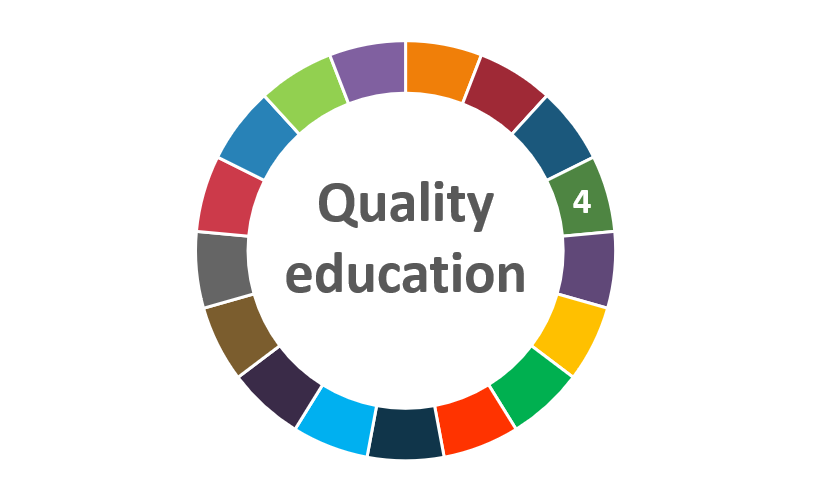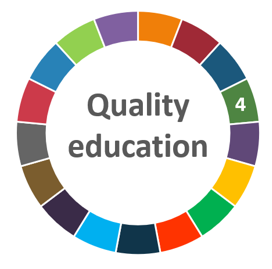
ΑΙhub.org
Quality education focus series round-up: teaching AI and using AI to improve teaching

In this article, we summarise the content from our focus series on the UN Sustainable Development Goal (SDG) number 4: quality education. In the series, we considered both the teaching of AI and machine learning itself, and the use of AI techniques to improve education in general. You can also find out more about conferences and events, and other interesting research at the intersection of AI and education.
Conferences and workshops
There are a number of conferences and workshops that focus on the education side of AI. In our focus series we heard from the co-chairs of the Symposium on Educational Advances in Artificial Intelligence (EAAI), which was held in February this year. This event is held as an independent symposium within the AAAI conference, and provides the opportunity for researchers, educators, and students to share educational experiences involving AI.
Within the symposium there was a special track on undergraduate research challenges. In this article, Todd Neller gives a history of these mentored challenges from 2014 through to the present, and shares a vision of how such offerings may become more diverse and engage a broader range of faculty mentors and undergraduate researchers.
The 2021 AAAI/EAAI Outstanding Educator Award went to Michael Wooldridge and he gave an invited talk at the conference on the subject of talking to the public about AI. This was a really interesting talk and Michael focussed on the various lessons he has learnt about science communication over the years. You can read our write up here.

Another invited talk at AAAI was given by Daphne Koller. She spoke about digital learning, an area in which she has much expertise, being a co-founder of Coursera. In this presentation she discussed the different motivations for online learning, what we know about effective learning, digital platforms, and using data to improve learning.
As part of the AAAI main conference workshop programme, attendees could drop in to the Imagining post-COVID education with AI workshop. You can now watch the recorded presentations and read the submitted papers.
In March, AAAI held a Spring symposium on artificial intelligence for K-12 education. All of the talks are available to watch on YouTube. This symposium brought together AI researchers, learning scientists, educators and policymakers to exchange problems and solutions.
In December 2020, a workshop entitled machine learning for education was part of the NeurIPS programme. This event featured a number of interesting talks, which are available to watch via the links on this webpage. You can hear about collaborative learning, multimodal machine learning for education, the use of ImageNets, and more.
Coming up in June this year is the Artificial intelligence in education conference. The theme for this year’s edition is: “Mind the gap: AIED for equity and inclusion”. The 2020 running focused on “Augmented intelligence to empower education”, and you can access the published proceedings here.
Another event coming up this year is the IJCAI2021 artificial intelligence for education workshop, which will take place in August. This workshop will focus on research progress on applying AI to education and challenges encountered in AI educational practice.
More articles from our focus series
In this article, Carles Sierra wrote about team formation techniques in education, describing how AI methods can be used to facilitate collaborative learning.

If you are interested in a crash course on AI then the Data Science Nigeria bootcamp could be right up your street. We wrote about it here and the article includes links to the video playlist and programme.
Interesting natural language processing work from researchers at Linköping University reports ways to better understand different types of reading difficulties. This knowledge can be used to develop digital tools that automatically adapt texts to the needs of readers.
Designing education to ensure no-one is left behind
In Skilling the Gap: 21 Conversations on Designing Education for Those Left Behind as Robotics and Artificial Intelligence Advance, Laura Gemmell, Lucy Wenham and Sabine Hauert conducted interviews with thought-leaders, businesses, adult educators and members of the public, with the aim of finding out how AI education could be designed to ensure that everyone has the opportunity to obtain the skills, understanding and confidence to use AI and robotics systems. Laura has written more about their paper here.
How AI is used in schools
In this video, Jordan Harrod talks about how AI is used in schools. She touches on topics such as automated grading to personalized coursework. It is well worth checking out the rest of Jordan’s YouTube channel; she posts regular videos on a huge range of AI-related topics.
From arXiv
Here are a couple of articles from arXiv on the topic of AI and education:
Lessons Learned from Educating AI Engineers, Petra Heck and Gerard Schouten.
Over the past three years the authors have built a practice-oriented, bachelor level, educational programme for software engineers to specialize as AI engineers. In their paper they discuss their programme and the lessons learned for industry and research.
Personalized Education in the AI Era: What to Expect Next?, Setareh Maghsudi, Andrew Lan, Jie Xu and Mihaela van der Schaar.
In this paper, the authors provide a brief review of state-of-the-art research, investigate the challenges of AI/ML-based personalized education, and discuss potential solutions.
Resources
There are lots of excellent resources for finding out more about AI. We’re busy collating them on our resources page. This is still very much a work in progress, so if you spot any that we’ve missed just let us know and we’ll add them. On this page you’ll find links to free courses, seminars, podcasts and other resources.
List of articles in the focus series
Here is a list of the content posted to date. The focus series remains open to contributions and these will be added as and when they are published. You can also click here to see the full collection.
Team formation techniques in education
Using machine learning to create texts for people with reading difficulties
Daphne Koller: Digital learning coming to life – #AAAI2021 invited talk
Michael Wooldridge: Talking to the public about AI – #EAAI2021 invited talk
Symposium on Educational Advances in Artificial Intelligence – a summary from the co-chairs
Data Science Nigeria AI bootcamp videos available online


tags: Focus on quality education, Focus on UN SDGs











